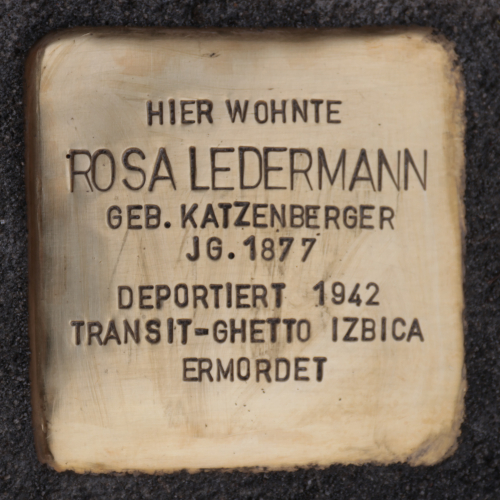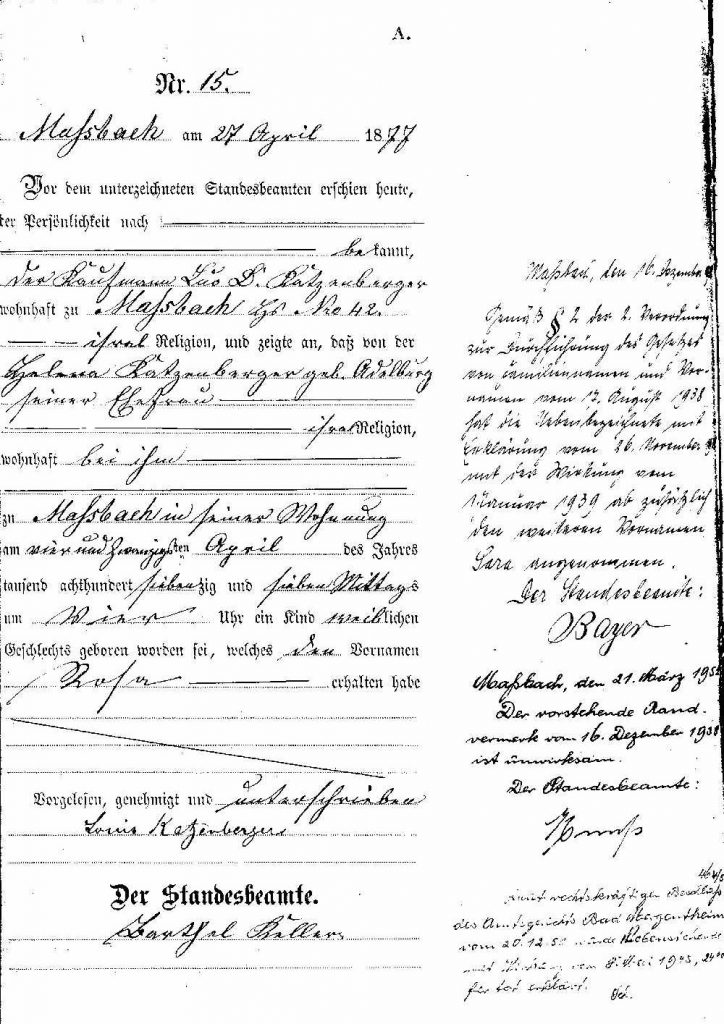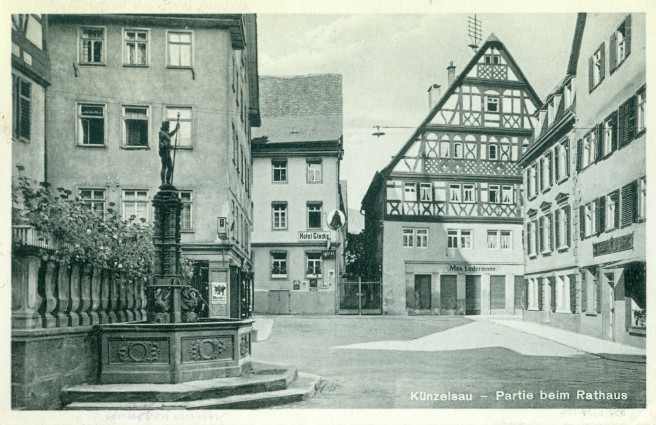
Position: Härterichstraße 7 – Bad Mergentheim

Rosa Ledermann
was born on April 24, 1877 in Maßbach (district of Kissingen), where her father Louis ran a store for men’s and women’s ready-to-wear clothing, shoes and colonial goods.
Rosa was the fifth of a total of 12 siblings, four of whom died as children. The eight siblings who reached adulthood all lived through National Socialism. Only one of them, David, survived the Holocaust.
The Ledermanns’ family life was probably marked by religiosity, for when their father Louis died in 1904, an obituary stated that he had served “30 years […] as Baal tekoa (shofar blower on the High Holidays) [and] probably 45 years […] on the High Holidays as the prayer leader.” [1]
In 1901 Rosa married Max Ledermann from nearby Oberlauringen. Together with him she had two children, Bella (s. Seldner; 1902-1980) and Luise (s. Jacobsen; 1907-1985) in 1902 and 1907.
How the following years went can only be guessed. However, a surviving photo of the Ledermann textile shop on the market square in Künzelsau indicates economic success. The store was located in a very stately building in the immediate vicinity of the Künzelsau town hall.

In 1925, the older daughter Bella married Alfred Seldner and moved to Krautheim. The younger daughter Luise married Otto Jacobsen in December 1934.
The year 1933 was a fateful year for all Jews living in Germany – Rosa Ledermann, however, was one of the first to feel the brutality of the Nazis directly.

On March 20, 1933, SA men from Heilbronn, together with SA men from Künzelsau, state hunter officials and Stahlhelm members, brutally mistreated Jews from Künzelsau. Max Ledermann, the head of the synagogue community, was not among those abused, but he set out during the night to find the abused religious teacher Julius Goldstein. What happened in the aftermath is not exactly known. There are two traditions: the more probable one says that Ledermann was beaten up in front of his friend Goldstein’s house and subsequently suffered a heart attack in the latter’s apartment. “Other sources say that the blow struck the synagogue executive when he saw Julius Goldstein. Max Ledermann died on March 20. He was the first to fall victim to the Nazi racial mania and terror – not only in Hohenlohe, but in all of Württemberg.” [2] The fact that the obituary makes no mention of the violence that caused his death indicates the atmosphere of fear in which the bereaved found themselves.

In view of this event, it is not surprising that Rosa Ledermann folded her tents in Künzelsau in 1934 and moved to Bad Mergentheim, where she took over the management in the branch of the shoe retail chain Springmann, which had existed since 1926. The owners of the company were her brothers David, Max and Leo Katzenberger.
Terror caught up with Rosa Ledermann in Bad Mergentheim as well, at the latest during the Reich Pogrom Night in 1938. The Tauberzeitung reported on 11.11.1938: “The deep indignation finally came out during the night, as in numerous places in Germany, also here [in Bad Mergentheim] through demonstrations against Jews and Jewish businesses. […] The Springmann shoe store also took its turn.” [3]. On November 19, 1938, the Tauber-Zeitung reported the transfer of numerous Jewish businesses into German hands, including negotiations for the sale of Springmann’s store; on December 7, 1938, it was still possible to identify one of Springmann’s advertisements. [4]
We do not know exactly when Rosa Ledermann moved to Schweinfurt to join her sister Recha (1883-1942) as a result of developments. The memorial book of the Federal Archives lists that Rosa Ledermann was deported from Stuttgart to Izbica on April 26, 1942, where her trace is lost. The deportation via Stuttgart indicates that she was not deported from Schweinfurt but from Bad Mergentheim. Of Rosa’s siblings, only her brother David survived the Holocaust. He survived Theresienstadt and emigrated to Palestine in 1946.
Daughter Luise fled with her husband from Germany to Palestine as early as 1934. Daughter Bella, together with her husband and three children, received permission to leave Germany in April 1940. On April 30, 1940 – almost exactly two years to the day before Rosa Ledermann’s deportation – the Seldner family took the last ship in Genoa bound for the United States.
Picture sources:
- Certificate of birth: The Freimann-Katzenberger Family Tree (geocities.ws) Original in Rathaus Maßbach
- Store of Max Ledermann: Stadtarchiv Künzlsau
- Shoe store Springmann: Stadtarchiv Bad Mergentheim
Sources:
[1] https://www.alemannia-judaica.de/massbach_synagoge.htm
[2] https://www.stimme.de/regional/hohenlohe/nachrichten/hohenloher-waren-die-ersten-opfer-art-1207588
[3] Tauberzeitung vom 11.11.1938, zitiert nach: https://www.schule-bw.de/faecher-und-schularten/gesellschaftswissenschaftliche-und-philosophische-faecher/landeskunde-landesgeschichte/module/bp_2016/nationalsozialismus_und_zweiter_weltkrieg/terror_und_verfolgung/biographisches-lernen-in-kl-9-am-bsp-judenverfolgung-in-creglingen-und-bad-mergentheim
[4] http://www.swp.de/bad_mergentheim/lokales/bad_mergentheim/Gebae (alemannia-judaica.de)
Laying Date: 19. June 2023
Sponsorship: available
Author: RH (Translated with www.DeepL.com/Translator (free version))